AudioCulture
The noisy library of New Zealand music
Te pātaka korihi o ngā puoro o Aotearoa
Chaii
Chaii’s adaptability led to a run of viral hits, boosted by their use in releases by Netflix and Disney, as well as in worldwide advertising campaigns. Her music had depth too, her remarkable debut album showcasing how hip hop could be fused with sounds from the Middle East.
Before she became Chaii, Mona Sanei spent her early childhood in Iran and at eight years old she moved with her family to New Zealand. She was immediately taken with the music of Eminem and other rappers of the era. By the time she reached intermediate school, she’d begun writing down lyrics and rhymes for songs. During her teens she found her ability to speak Farsi was slipping so she sought out Persian music and films. This influence fed into her tracks when she began making her own music, while at Epsom Girls High School.
Chaii started using GarageBand to experiment with Middle Eastern samples and hip hop
“At first I was just using GarageBand to experiment with taking Middle Eastern samples and mixing them with hip hop. I’ve listened back to a few of them and they don’t sound very glued together, but there was still an interesting vibe. Since then I’ve just been trying to bring those two worlds together, so that it sounds like its own little pocket of music rather than the two parts feeling so separate. After high school I started doing shows and my sound was just straight hip hop, but in the background I was still making bedroom beats for myself and kept drawing from my roots.”
She also had a strong interest in visual arts which took precedence for a few years when she enrolled in a spatial design course at AUT. Her studies sometimes took a backseat when she snuck off to the studio rather than attending to her assignments. Eventually she decided to throw herself into music wholeheartedly by enrolling at SAE (the School of Audio Engineering); after graduating she became a tutor.
Up to this point she rapped under a couple of different names, but wanted something more suitable. “I wanted to find an easy name that was pronounced the same and had a similar meaning in both English speaking countries and in the Middle East. Chai means tea wherever you go, so I thought – that’ll do.”
She added an extra “i” to make the name easier to search.
Chaii’s involvement in the music scene led her to meet the musicians from Yoko-Zuna, a band largely made up of jazz players from the University of Auckland’s music school, but who drew from hip hop and electronic music to create a heady fusion of styles. Frank Eliesa aka Frank Keys was their keyboardist and synth-bass player. He ran a midweek jam session at Rakinos cafe on High Street with his friend Swap Gomez on drums, which led to the idea of forming a group with fellow students Kenji Iwamitsu-Holdaway (guitar, bass) and JY Lee (saxophone, flute). The name “Yoko Zuna” refers to the top level of sumo wrestlers.
Chaii first came across them by chance.
“I was working on a video shoot for a friend of ours, Laughton Kora. He was doing a video with P Diggs and my friend Mikey Rockwell was working on it, because he’s an amazing video producer and director. I was helping out and Laughton said, ‘hey, tonight we’ve got a show, come along.’ It just so happened that Yoko-Zuna were the opening act. That’s how I met Frank. I think Yoka-Zuna had been together for about one or two years at that point, so it was quite early on. That led to me doing some filming for Yoko-Zuna. We were both making our own music and Frank was working with a lot of other artists, but after a few years we organically started making music together.”
She originally produced her own songs – including early track ‘South’ – but also got Frank involved for one early track, which was the start of a long and fruitful collaborative relationship:
“I had the start of ‘Digebasse’ and was experimenting with it in the studio. That’s the first time Frank came on board – he added a bass line to it.”
Launching worldwide
In order to emphasise the roots of her music, Chaii used NZ On Air music video funding she received for her first three tracks (‘South,’ ‘Digebasse’, and ‘Trouble’) to arrange a trip to Oman. She directed the filming, working alongside director of photography Abe Mora, stylist Brooke Tyson, and the ever-helpful Frank Keys, who was now her fiancé. She figured this was the closest she could get to filming in her hometown, Ahwaz, in southern Iran. While in Oman she performed a gig in a basement venue, which gave her a chance to check out some local rappers. The resulting music videos provided a stunning introduction into Chaii’s sound and look.
The ‘Digebasse’ video overturned western stereotypes about Middle Eastern countries by presenting the vibrancy of Persian style, the striking architecture of the city, and the beauty of the surrounding landscape. Chaii and two companions swapped between a pick-up truck and camels to travel through the desert, while dressed in brightly coloured robes and headscarves, essentially taking a modern approach to the chador and hijab. Nigerian-Australian rapper B-Wise also made an appearance on the track and video.
Her raps fluidly mixed English and Farsi, for a message of empowerment and resistance
The raps fluidly mixed English and Farsi, providing a positive message of empowerment and resistance (‘Digebasse’ loosely translates as ‘Enough’). The video was released on International Women’s Day (9 March 2019), but at first Chaii only uploaded it to Facebook, which helped focus attention on this single iteration of the track. It worked and the video raced past 700,000 views in a couple of days.
She hadn’t even officially released a single yet, but jetted off to perform at the Big Sound conference in Australia and worked with Keys on music to accompany a UFC/Fox Sports Australia ad that aired during the NRL grand final (this track became the first in a series). The growing buzz around her music provided the perfect launchpad for ‘South’ which became her official debut single when it was released through more standard means (Spotify, YouTube etc) in October. It was eventually used for a Fendi online campaign and featured on top-selling game, Tony Hawk’s Pro Skater 1+2.
Chaii was friends with the music producer Soraya LaPread, who has credits on tracks by Blackpink and Burna Boy, and is the daughter of Commodores bassist Ronald LaPread. Soraya helped Chaii develop the grinding synth bass and a sparse, off-centre beat of ‘Nobody Know’.
“I made the ‘Nobody Know’ beat in 10 minutes, “says Chaii, “and it didn’t change through to the final version. At first, I thought nothing of it, but I showed it to a friend of mine, Soraya [Lapread], and she was just like, ‘you need to put this out, let’s work on it!’ I just thought it was a shitty little demo, but she thought it was cool. I was definitely glad that one came out, because it ended up on the Fendi campaign.”
Further production work on ‘Nobody Know’ was done by US producer Sylvia Massy (Prince, Tool, Johnny Cash) in Oregon, which saw another layer of texture added to the track through the use of vintage microphones and instruments. The in-your-face power of the track saw it picked up for big synch placements, appearing on ad for the Apple iPhone 12 and as part of the soundtrack of the Netflix film The Old Guard (starring Charlize Theron).
These tracks were compiled on Chaii’s six-track Lightswitch EP. It was released by Particle Recordings, which is an imprint of Bigpop, the label started by Chris van de Geer and Joost Langeveld as an extension of their commercial work. This gave Chaii distribution through BMG and access to the founders’ decades of experience, as exemplified by Van de Geer helping mix her next single, ‘Trouble’. Chaii would later enlist the help of inhouse engineer Maude Morris to record live instruments.
‘Lightswitch’ was a bold, brash number that caught fire online
The EP’s title track ‘Lightswitch’ was a bold, brash number that caught fire online. It opened with a wonderfully warped synth riff by Frank Keys, before introducing a thumping beat. Chaii was a commanding presence at the centre of each track, rhyming with attitude but also providing chorus hooks that were impossible to get out of your head.
Chaii once again took an international approach to shooting music videos for these tracks by heading to California to film clips for ‘Lightswitch’ (a colour-boosted vid shot in iconic LA locations), ‘Middle Ground’ (a moody vid in Joshua Tree), and ‘Nobody Know’ (filmed outside of a stucco bungalow with a very Persian look to it). Chaii was drawn to California after reading that, in the wake of the upheavals caused by the 1979 Iranian revolution, it gained the largest Persian music community outside of Iran.
New hook-ups
Chaii already had a few new tracks underway before the Lightswitch EP even dropped. In early 2020, she took part in a Songhubs event organised by APRA, which put together local songwriters from different backgrounds so they could try creating music together. Chaii found herself excited by the mix of people in the room.
“This was the most magical songwriting camp. I was there with Rory Noble, Kings, James [Lawrence Arabia], Hugh [Mazbou Q], and Will Henderson. Between us we came up with two songs and I was like – ‘I’m putting both of these out!’ When we did ‘Wow (Look At Me)’, I remember James just singing this line of gibberish for the breakdown and I told him we should just keep it as it was, because it was such a vibe. But everyone involved added interesting bits like that. On ‘Pineapple Pizza’ Rory definitely did his thing on the production side, then me, James, and Kings began throwing lines at each other, just trying to be funny. When Kings said the line ‘maxed out like a visa’ I thought he was talking about the kind you’d need to enter a country. Such a typical immigrant thing to think! But of course, he meant a credit card. We were super collaborative in those moments and everyone contributed something.”
However, she found that the highs of the Songhubs event were followed quickly by bad news.
Covid arrived, and the massive tour chaii scheduled had to be cancelled
“Songhubs took place a week before we were about to head off to perform at South by Southwest. Then literally while we were in the sessions, we found out that the Covid lockdowns were happening. I had this massive tour booked that had to be cancelled. But I’ve always been a believer in the idea that what is meant to be will be. I try not to be affected by sudden changes. Things go wrong one year, but then something better ends up happening – that’s how I try to look at it.”
There were certainly some positive things in the works. After the Lightswitch EP came out in July 2020, the title track was picked up for the Disney show Ms. Marvel and the FIFA 21 console game. As part of the FIFA 21 launch in October 2020, Chaii was asked to film a live session, though – to fit in with the ongoing Covid restrictions – she arranged for herself, Brandon Haru, and Frank to do their performance on the field of Mt Smart Stadium with no audience present.
A month later, Chaii dropped ‘Wow (Look at Me)’, the track she’d written with Kings, Lawrence Arabia, and Will Henderson. It was another instant banger, with one of her best hooks yet. Unsurprisingly, it followed her previous tracks in gaining some impressive placements. It joined ‘Lightswitch’ on the soundtrack of the Netflix documentary Inventing Anna and became her second track to be used for a high profile iPhone ad campaign (this time for the iPhone 12 Pro).
She was increasingly in demand on the summer festival circuit and enjoyed the chance to play with an audience’s expectations, as she did when she appeared at Splore.
“For the first song, I did a cover of a Persian track and people just came running up to join the crowd, because it’s such a danceable type of music. It was just buzzy to see everyone dancing to this music I’d grown up with as a kid. I’d also made this beat that was inspired by the kind of Persian music you’d hear in the town where my grandmother lives – it was a very traditional breakdown section for dancing. I put that right in the middle of the set. My parents were there and they were blown away because the dancing was so full-on in the crowd!”
Chaii started 2021 with two more savvy collaborations. Her songs had elements of dance music, but ‘Oh Nah Yeah’ saw her step even further in this direction by working with EDM DJ Party Favours, creating a track with dubstep bass and a funky beat (with input from Frank and Connor Waine). Then she drew again on her connections from the Songhubs event by using a beat that Rory Noble had brought to the table, which was then complemented by guest verses from Kings and NZ-African rappers eleven7four, resulting in the track ‘Might Just.’ This pair of singles showed her ability to switch styles: she might move from dance music to underground hip hop, but it all sounded like Chaii.
Chaii’s previous five singles all surpassed a million streams
Her previous five singles all surpassed a million streams, cementing her place as one of Aotearoa’s foremost rappers. Even a sparse, throwaway track like ‘Get It Done’ oozed with coolness, as did the playful video that just showed her and Keys hanging around in a warehouse space.
When it came time to put together her previous singles as an EP, she finally released her poppy, oddball number ‘Pineapple Pizza’ (written with Lawrence Arabia, Mazbou Q, and Rory Noble).
Her music videos were consistently impressive, but this time she outdid herself by filming in the beautiful Hamilton gardens and having choreography done by Kiel Tutin. No surprise, she ended up with yet another million-streamer.
Reaching new heights
Chaii had become so adept at creating punchy hip hop tracks that it was sometimes easy to miss the Persian rhythms that had subtly inspired them. However, there continued to be tracks where this aspect was pushed to the fore, such as ‘Mano Tou’ off the Pineapple Pizza EP, which featured Iranian rapper, Chvrsi. The music video for her next single ‘Drippin’ In Gold’ emphasised the immigrant drive to succeed, showing her in Los Angeles hanging with a group of men from the local Middle Eastern community alongside a Paykan (a classic Persian car), juxtaposing these scenes with shots of her in a mansion dressed exquisitely. This track became the lead single of her next EP, Night Like This, which was basically a foretaste of the album to come.
In the meantime, she’d achieved new milestones – performing at SXSW in the US (in 2022) and being added to Spotify’s Radar Program, which helps promote rising acts. She was also asked to take part in the Coke Studio promotion, which saw her being funded to write a song with two rising Australian artists – Young Franco and Tones and I.
“I went over to Sydney quite a few times during 2024 for that project, including the music video. The whole idea was to show the behind the scenes process – from collaborating on writing the track through to making the music video and then performing the song live. They wanted to make the whole process very transparent and show what goes on in those moments. There was the added pressure of being filmed, but we wrote the songs in a couple of days. You can hear all of us throwing in ideas. We actually made two or three songs, but only one was finished and released.”
The resulting track ‘(Can’t Get You) Off My Mind’ became one of Chaii’s biggest streaming tracks, boosting her profile in Australia and beyond.
Despite working with so many other acts over the previous few years, Chaii’s main collaborator continued to be Keys. They had gradually settled into a comfortable working routine at their house.
“I just started getting lazy when it came to doing beat production, because Frank was really nailing the mix of Persian and western music I was aiming for. When we came to the album, he did all of the beats. We would just send stuff to each other from two different rooms in the same house. He’d start with a loop of beat – just enough to do a verse and a hook over. I’d take it, chop it up, and arrange it, then I’d do the first layer of vocals on it, which might just be gibberish at that stage. I’d send that back to Frank and he would expand on that structure and create an updated beat. Then I’d record my main vocals and produce them – make my a capella sound pretty and properly mixed, before sending it back to him. Then he might do a bit more on the beat side and add any more bits of instrumentation, before we’d finally bring our mixes together – his beat mix and my vocal mix. Luckily, because we have similar taste, it always blends in well.”
The result of their work was Chaii’s most comprehensive statement-of-intent, the album Safar (2025). Persian rhythms and instrumentation were blended seamlessly through the hip hop tracks on the album. The first sound on ‘Main Thing’ was a loop of a traditional Persian drumming pattern, before a soprano sax line by JY Lee wended its way over the top, matching the style remarkably well. Other traditional instruments were folded into the beat on ‘Back On A Roll’ and Chaii included lyrics in Farsi across the album (most notably on the track ‘Safar’). The smoothness with which Keys and Chaii added these elements into the mix meant that listeners didn’t always appreciate what an amazing work of cross-cultural fusion this album was.
Chaii had the chance to highlight the Persian elements of her music at Womad in 2025
Chaii had the chance to highlight the Persian elements in front of an open-minded audience, when she played at Womad festival in 2025 and she enjoyed finding herself alongside acts such as the Palestinian-diaspora group, 47 Soul. She also planned her first tour outside of Australasia, with dates booked in the UK, Germany, and the US.
Through these efforts, she hopes to continue bringing her unique sound to more listeners, always with the hope that some will dig behind the catchy sounds to discover the aspects of her heritage that she has folded into her sound.
“I love it when people are vibing to a song and finding it familiar, like something you’d hear on the radio, but there’s also something unusual in the sound and they can’t quite put their finger on what’s different about it. That’s the sweet spot, where I feel like I’m bringing Persian music into the mainstream or, at least, to a wider audience. Other tracks are more experimental with more full-on Persian elements. The album goes all the way between the heavily Persian tracks through to the more standard hip hop and electronic tracks. Sometimes I do Persian singing, but in a western way, other times the lyrics are in English but they’re delivered in a middle eastern style. So my music is constantly going between worlds and that’s how I like it.”
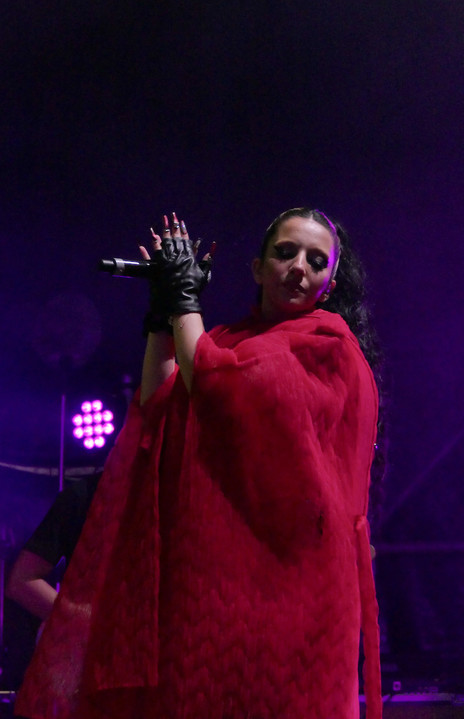
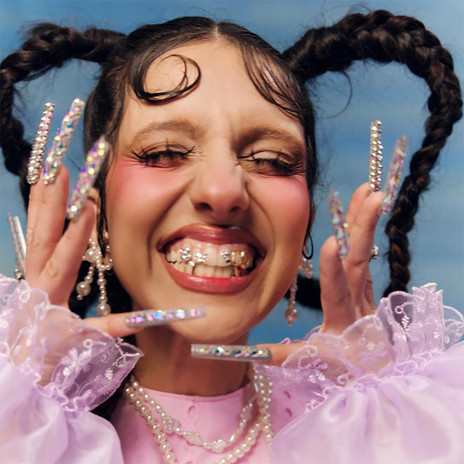
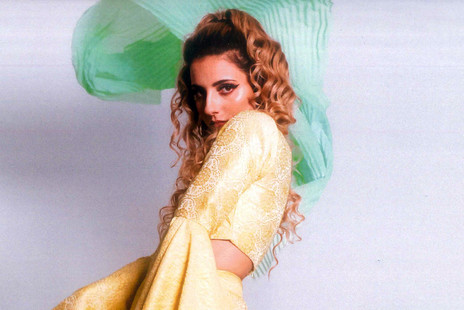
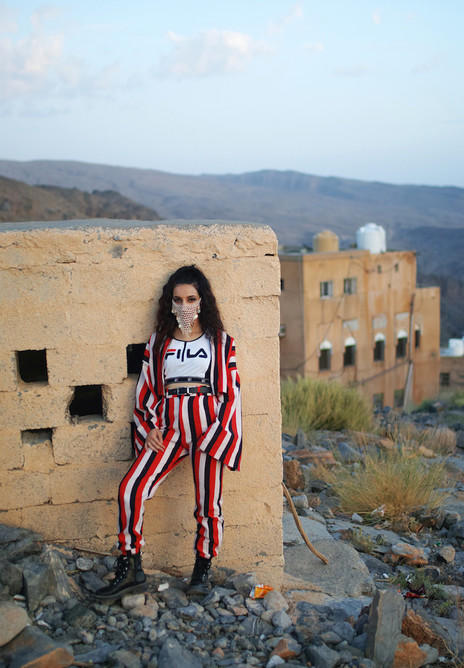
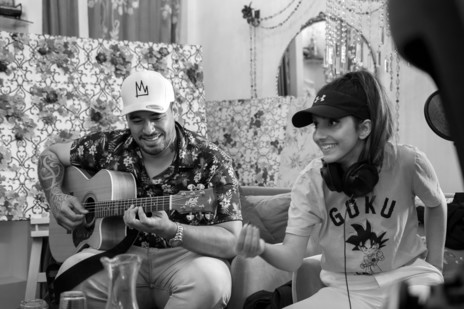
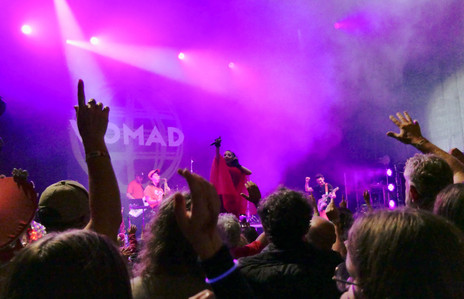
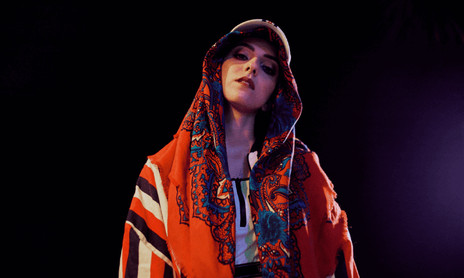
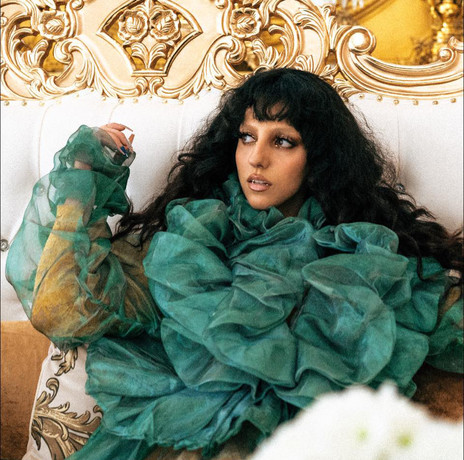
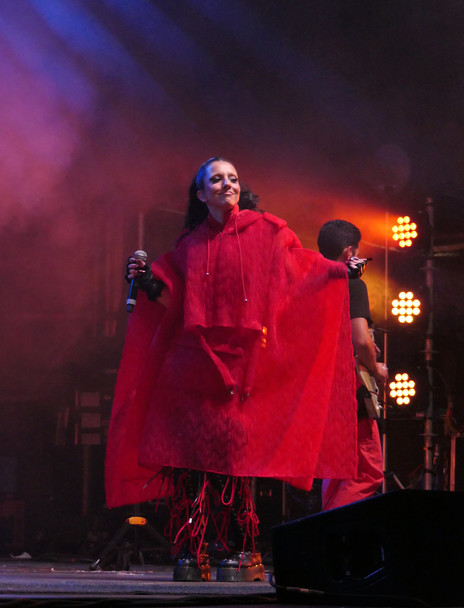
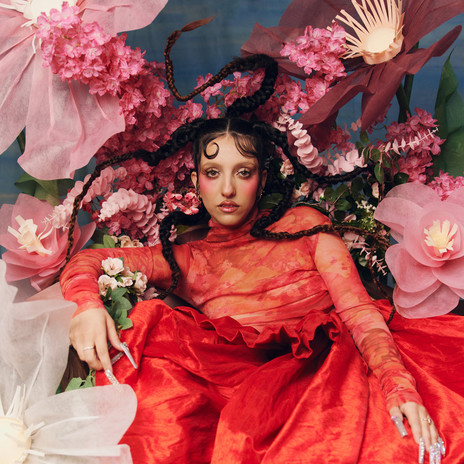
Bigpop
BMG
Visit our sister site
NZ On ScreenMade with funding from
NZ On Air















